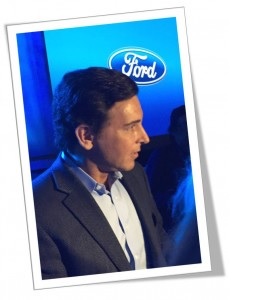
Our blog title today borrows the questions that Ford CEO Mark Fields is now using to refine his company’s focus in a rapidly changing environment. A Business Insider article picks up on yesterday’s post about Apple’s investment in automotive. Since attaining Ford’s top spot, we have talked about Fields’ commitment to adapting to disruption, frequently expressed in his colorful keynotes at CES these past two years. When it comes to Ford’s future, he is as serious as a heart attack about the company – and the entire auto industry – being at “an inflection point.”
He now goes so far as to say that Ford is evolving from “an auto company to an auto-mobility company.” It would be like a broadcast radio exec saying her company is transitioning from “a radio company to a media entertainment company,” but these are the times in which we live.
While Google got the autonomous ball rolling, startups like Zipcar, Uber, Lyft, and others have vaulted the “shared mobility” space into the mainstream. And now that Apple is investing billions into these new ways we’ll be traveling on highways and backroads, traditional automakers have the choice: jump into the game or be left behind. Everyone acknowledges that fewer vehicles will be sold in this new mobility future, so it’s paramount that traditional auto companies figure out a way to adapt and adjust.
Many of the alliances and marriages being announced in recent months would have been inconceivable just a few years ago, but today it’s not unusual for automotive, shared mobility, online transportation, and tech companies to find ways to work together to ensure a profitable future. Here are several recent developments and partnerships that leave no doubt that driving as we know it will forever change, and with it, the companies that have built our cars and trucks:
- GM and Lyft are launching an initiative to test a fleet of self-driving electric taxis on public roads using the new Chevy Bolt electric vehicles.
- Toyota has invested an undisclosed amount of money in Uber.
- Volkswagen is investing $300 million in Gett, a European app like Uber and Lyft.
- Fiat, Chrysler, and Google are testing a fleet of autonomous minivans.
- Google is opening an R&D autonomous center in Novi (just outside Detroit), providing access to automotive talent in the market.
- And the aforementioned Apple has invested $1 billion in Didi Chuxing, a Chinese competitor of Uber’s.
Why all this activity and all this investment? For Mark Fields (and most other automaker CEOs), there’s simply no choice. The article notes Ford is thinking now in terms of “vehicle miles traveled instead of vehicles sold.” That is truly a game-changer in the way the auto industry will measure success. You can imagine what every one of his car dealers must be thinking when they read that quote, but the change to autonomous and “shared mobility” isn’t a question of if but a matter of when. And “when” is coming faster than everyone thought.
Fields says Ford is asking its teams to address three key issues, and if you’re thinking they would be smart questions for radio broadcast companies to ask, we are on the same page:
1. Where do we want to play?
2. How do we win?
3. What do our capabilities need to be?
Radio was slow to embrace the disruption represented by streaming and mobile, so in many ways, podcasting may be analogous to autonomous driving. It represents an entirely new way of consuming audio in the same locations where radio was once the only source of content available.

Perhaps podcasting is not the fait accompli that cars that drive themselves will become, and the scale is clearly much smaller. But the potential for podcasting to disrupt traditional radio consumption is becoming increasingly more evident, leaving broadcasters with many of these same choices to make and questions to answer that Mark Fields and his CEO peers are facing each and every day.
Hubbard and Scripps are two companies that have stepped up to embrace podcasting. iHeartMedia and CBS Radio have also started their own podcasting divisions. And of course, NPR and other public radio networks have committed to and excelled in the on-demand space for years.
But in the main, most radio operators are still in the formative stages when it comes to podcasting and on-demand audio. And the clock is ticking.
This is why we look at an event like Podcast Movement in Chicago next month as a way to learn, network, and potentially partner with those who are already deeply ensconced in the space. If we’ve learned anything from our company’s involvement in the auto industry, it’s that embracing technology and disruption are the first steps to survival.
As Bill Ford, Ford’s Executive Chairman, noted last month about his industry’s interest in making deals, starting tech initiatives, immersing in new initiatives, and creating new partnerships:
“Anything is possible with anybody.”
And something tells me that if one of radio’s CEOs asked Mark Fields his opinion about whether to avidly pursue the podcasting opportunity, he’d invoke Ford’s latest slogan:
“Go further.”
Thanks to JacoBLOG readers Rob Basile and Bruce Goldsen for the tips.
- Why “Dance With Those Who Brung You” Should Be Radio’s Operating Philosophy In 2025 - April 29, 2025
- The Exponential Value of Nurturing Radio Superfans - April 28, 2025
- What To Do If Your Radio Station Goes Through A Midlife Crisis - April 25, 2025




Leave a Reply